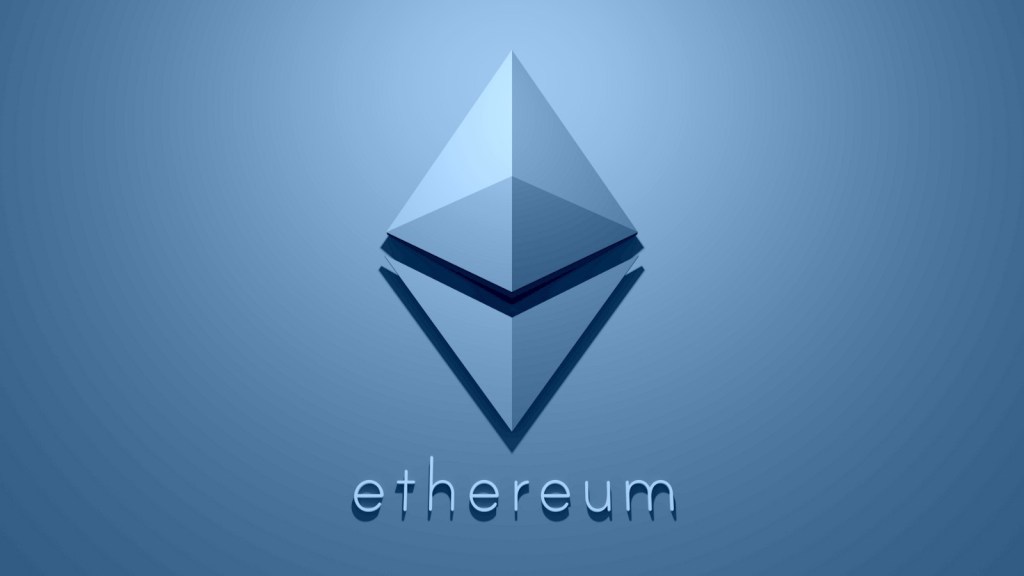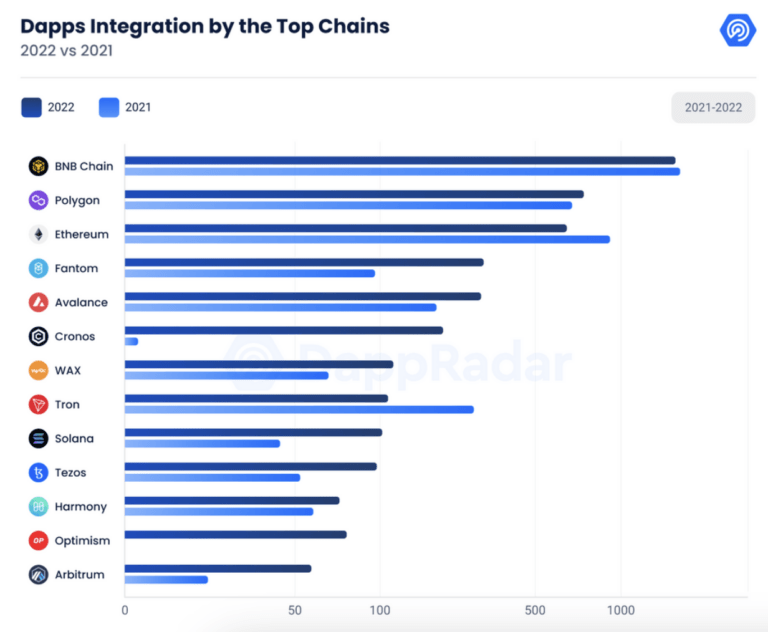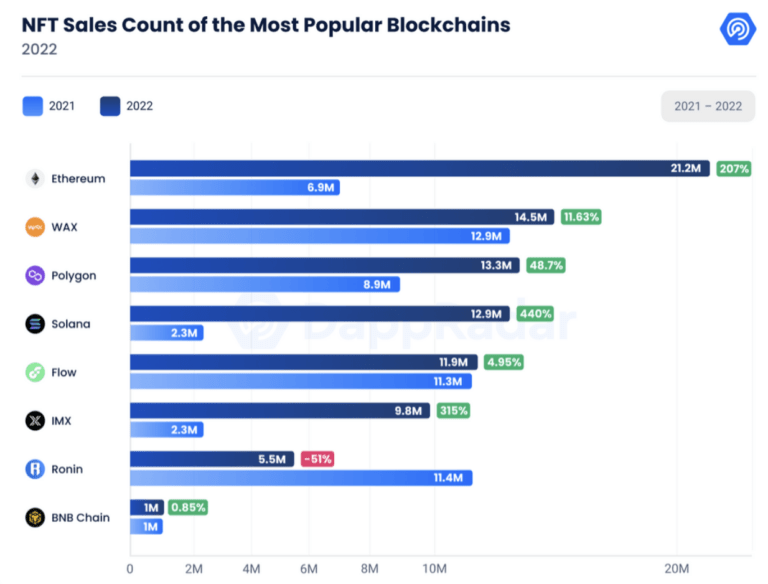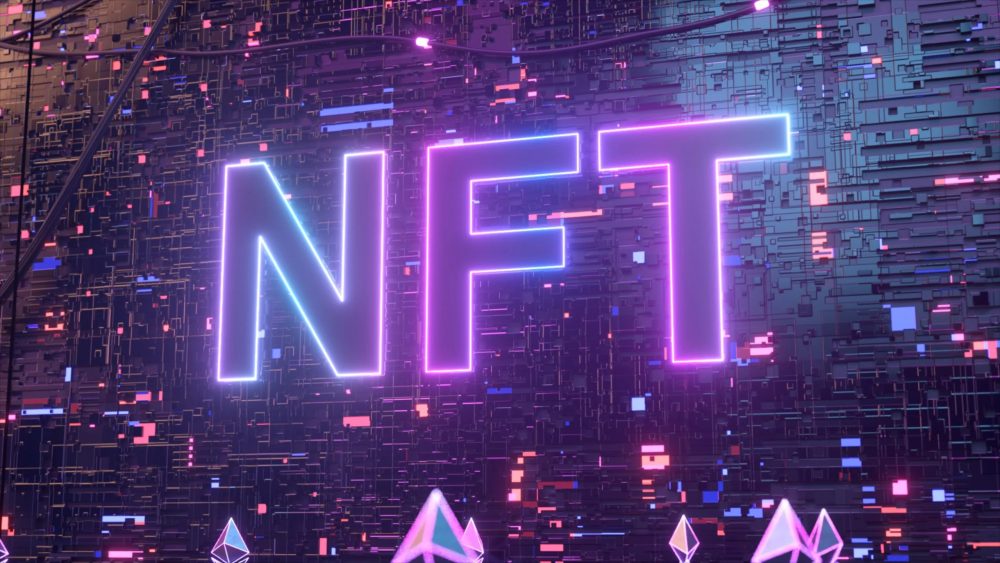AI NFTs are coming to Polygon and this altcoin chain deployed the most dApps in 2022, while Ethereum led the pack for NFT transactions.
This altcoin ranks first in NFT transaction volume
According to a recent report by DappRadar, BNB Chain deployed the highest number of dApps through 2022, with 2,163 dApps, while Ethereum NFT ranked first in transaction quantity.

With 21.2 million transactions, Ethereum (ETH) was the busiest platform for NFT sales in 2022, followed by WAX (WAXP) second and Polygon (MATIC) third with 14.5 million 13.3 million transactions. Meanwhile, BNB Chain only recorded 1 million NFT transactions during the year.
dApp integrations
Despite a 7% drop since 2021, BNB Chain topped the list, integrating 2,163 dApps in 2022. Polygon and Ethereum are second and third in the rankings, with over 500 integrations each.

Except for BNB Chain, Ethereum and TRON (TRX), others have seen an increase in the number of integrated dApps. By the end of 2022, BNB Chain’s dominance in dApp integrations is 36.7% compared to 43.7% in 2021. Second in line, Polygon’s dominance also dropped slightly from 13% in 2021 to 12.8% in 2022. Ethereum’s dominance also fell from 16.4% to 11.4% in 2021
Applications that pose a high financial or operational risk became the dominant dApp category for BNB Chain with 31%. Gaming and NFT were the most common categories for Polygon and Ethereum with 21% and 35% respectively.
NFT sales
Ethereum-based NFT sales exceeded 21.2 million in 2022. This represents a 207% increase from 6.9 million in 2021. Wax and Polygon followed Ethereum in second and third with 14.5 million and 13.3 million transactions, respectively. Despite its leading performance in dApp installments, BNB Chain is at the bottom of the list with 1 million NFT transactions.

However, based on their year-over-year growth percentages, Solana (SOL) and Immutable X (IMX) beat Ethereum in first and second place. In contrast to Ethereum’s 207% growth, Solana’s transaction count rose 440% and Immutable X’s 315%.
Ethereum is also the network with the highest intrinsic NFT value in 2022, with over $300 per NFT transaction. Polygon and Solana follow Ethereum in second and third place at $104 and $88 per transaction, respectively.
AI avatars unlock in this altcoin
Alethea AI and Polygon Labs are jumping on the artificial intelligence hype with the launch of an AI-powered NFT project that will allow users to create NFT avatars via text-based prompts similar to OpenAi’s Dall-E image generator.

The project plans to allow ‘anyone to quickly create, train and trade AI Characters as NFTs in Polygon’. Created by Alethea AI, CharacterGPT claims to “go beyond traditional text-to-picture engines like Open AI Dall-E 2 to create fully interactive and intelligent AI characters with a one-line prompt in natural language.”
Founder developed new modeling
NFTs can be printed at mycharacter.ai via the Polygon dApp from Alethea AI. To launch the dApp, a digital version of Polygon co-founder Sandeep Nailwal, a 1/1 NFT ‘AI Collectible’ modeled on his writings, press releases and interviews was made.
A gold checkmark next to collectible AI indicates that it has been verified that NFT was created with his permission. Alethea leverages the ‘AI Protocol: a property rights and ownership layer for Generative AI currently live on Polygon’ to manage this process. Speaking about the project, Nailwal commented:
“I’ve seen firsthand how Alethea AI has developed this technology over the past few years and through the CharacterGPT AI engine… We are excited to continue supporting Alethea as it builds on Polygon and to bring the power and potential of productive AI to the thriving ecosystem. “

Alethea AI COO Ahmad Matyana gave some examples of potential use cases for the new technology as ‘users can now create interactive, intelligent characters that can serve as AI companions, digital guides or NPCs in games’.
The company also hopes that public figures will use its AI engine to create their ‘digital twin’ to ‘serve as digital companions for their fans’. Because assets can be trained, digital assets can also be used in metaverse, games, museums, sports stadiums, and other real-world locations to interact with users and act as virtual guides.







